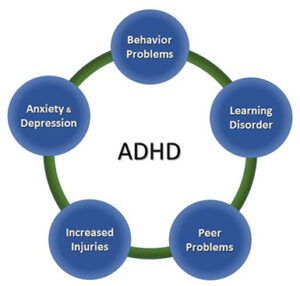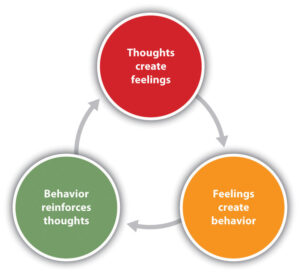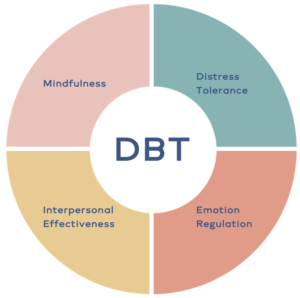ADHD, or Attention Deficit Hyperactivity Disorder, is a mental disorder that is characterized by problems with focus, hyperactivity, and impulsiveness. ADHD can make it difficult to succeed in school, work, and relationships. While there is no cure for ADHD, there are treatments that can help manage the symptoms. One treatment option is psychotherapy. In this blog, we will explore the different types of psychotherapy for ADHD.
Contents
What Is ADHD?

ADHD is a neurodevelopmental disorder that affects millions of children and adults across the globe. It is characterized by inattention, hyperactivity, and impulsivity which can cause difficulties with academic performance, social interaction, and daily functioning.
The signs of ADHD can vary from person to person, but many individuals with the disorder struggle with organizing tasks, paying attention, controlling emotions and behavior, and maintaining focus. The causes of ADHD are still unknown, but genetic and environmental factors are thought to play a role.
Treating ADHD usually involves a combination of medication and psychotherapy. Psychotherapy can be an effective way to help those with ADHD learn how to better manage their symptoms and cope with the challenges they face due to their condition.
Psychotherapy for ADHD
Many different types of psychotherapy can be effective in treating ADHD. Here are some of the most common:
Cognitive Behavioral Therapy (CBT)

Cogntive Behavioral Therapy is a form of therapy that focuses on changing the unhelpful thought patterns and behaviors associated with ADHD. It involves identifying and challenging unhelpful beliefs, developing strategies to manage symptoms, and learning new skills to help cope with difficult situations.
When this type of therapy is used to treat ADHD, it can focus on improving self-control and regulating emotions, as well as reducing impulsivity and increasing concentration.
Interpersonal Therapy (IPT)
Interpersonal therapy is a type of psychotherapy that focuses on addressing relationship issues related to ADHD. It focuses on helping individuals with ADHD better understand how their behavior affects others, as well as how to better interact with people in their lives.
It can also help individuals learn strategies for managing the symptoms and negative effects of ADHD. IPT often utilizes role-playing activities, communication training, and problem-solving techniques to improve social functioning and interpersonal relationships.
Family Therapy
Family therapy is a type of psychotherapy that focuses on building a supportive relationship between family members. It can be particularly useful for individuals with ADHD because it helps family members learn how to manage difficult behaviors and provide support for each other in managing symptoms.
In family therapy, family members can learn communication and problem-solving skills that can help them better manage the symptoms of ADHD in family members.
Mindfulness-Based Therapies

Mindfulness-based therapies are a type of psychotherapy that focuses on teaching individuals the practice of mindfulness or being aware and present at the moment without judgment. This type of therapy has been used to help individuals with ADHD manage the symptoms associated with their condition.
Studies have shown that practicing mindfulness can help reduce hyperactivity, impulsivity, and inattention. Also, mindfulness can be beneficial in reducing stress, anxiety, and depression.
This type of therapy is typically conducted over 8-12 weeks and includes several different techniques such as deep breathing exercises, meditation, yoga, and guided imagery. During the sessions, individuals learn to recognize their thoughts and feelings without judgment or self-criticism.
Exposure Response Prevention Therapy
Exposure Response Prevention (ERP) therapy is a type of psychotherapy used to treat Attention Deficit Hyperactivity Disorder (ADHD). ERP works by gradually exposing the patient to situations or activities that trigger their level of anxiety or distress, and then teaching them how to manage these reactions.
This allows them to gain control over their reactions and ultimately helps them reduce or eliminate their anxiety or distress. During an ERP session, the patient is encouraged to identify and confront situations that cause them fear or stress, and then practice relaxation techniques to learn how to better manage these triggers.
For example, a person with ADHD may be asked to sit in a crowded room for gradually increasing lengths of time, and be taught strategies to self-soothe when feeling anxious. Additionally, they may be encouraged to practice mindfulness or breathing exercises to better focus their attention on the present moment.
Dialectical Behavioral Therapy

One type of psychotherapy that is effective in treating ADHD is dialectical behavioral therapy or DBT. This type of therapy combines cognitive behavioral techniques with an emphasis on mindfulness and acceptance.
It helps individuals identify thought patterns and behaviors that may be contributing to their difficulties and then teaches skills for changing those thoughts and behaviors. Through this process, individuals are taught to become more mindful of their thoughts and emotions, as well as develop healthier coping strategies.
One of the main goals of dialectical behavioral therapy is to help individuals manage their emotions more effectively. This includes teaching distress tolerance skills such as self-soothing, distraction, meditation, and self-compassion. Additionally, it helps individuals develop better interpersonal skills to improve their relationships with others.
Acceptance and Commitment Therapy
ACT is a type of psychotherapy that focuses on living in the present moment while accepting oneself and others. It encourages people to observe their thoughts without judgment and use values-oriented behavior to guide their actions.
This type of therapy is particularly useful for ADHD because it can help individuals better manage their anxious or intrusive thoughts, which is an issue many people with ADHD struggle with. It can also help individuals with ADHD learn how to stay focused and organized by teaching strategies for self-monitoring, setting goals, and managing time more effectively.
Additionally, it can help people with ADHD identify the values that are important to them and engage in behaviors that align with these values.
Overall, Acceptance and Commitment Therapy provides people with ADHD a way to manage their symptoms and create positive changes in their lives. It can help individuals gain insight into the underlying causes of their issues and teaches them how to better handle difficult situations in a healthier, more productive way.
How To Choose The Right Type of Psychotherapy For ADHD?

When it comes to choosing the right type of psychotherapy for ADHD, there are a few things you need to take into account.
- The first is the severity of your symptoms. If you have mild ADHD, cognitive behavioral therapy may be all you need. However, if you have moderate or severe ADHD, you may need a more intensive form of treatment, such as medication management or family therapy.
- The second thing to consider is what type of psychotherapy will best fit your needs and lifestyle. If you prefer a more hands-off approach, online therapy may be a good option for you. If you prefer a more traditional face-to-face approach, individual therapy may be a better fit. There are also various types of group therapies available for those with ADHD.
- The third thing to keep in mind is what your goals are for treatment. Do you want to focus on symptom management? Or do you want to work on other areas of your life as well, such as relationships or careers? Once you know what your goals are, you can narrow down your choices and find the type of psychotherapy that will best help you achieve them.
An experienced mental health professional can help you determine the type of psychotherapy that will best meet your needs. They can assess your symptoms and provide you with personalized advice on how to manage ADHD in the most effective way possible.
Conclusion
Psychotherapy can be very effective in helping individuals with ADHD manage their symptoms. Different types of psychotherapy have different approaches and strategies for managing the condition, which can help people find the approach that works best for them.
It is important to remember that psychotherapy should always be combined with other interventions such as medication and lifestyle changes to ensure a comprehensive approach to treatment. With this knowledge, it is possible to develop an individualized treatment plan tailored specifically to your unique needs to achieve optimal results.
For more information, please contact MantraCare. ADHD is a neurodevelopmental disorder characterized by difficulty paying attention, hyperactivity, and impulsivity. If you have any queries regarding Online ADHD Counseling experienced therapists at MantraCare can help: Book a trial ADHD therapy session


